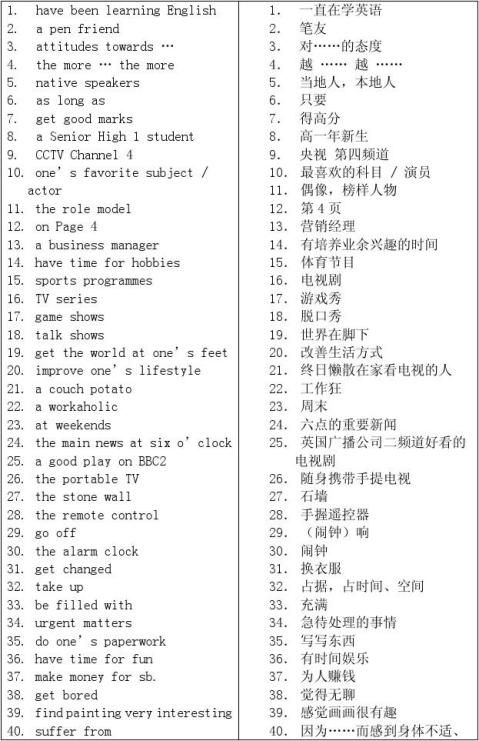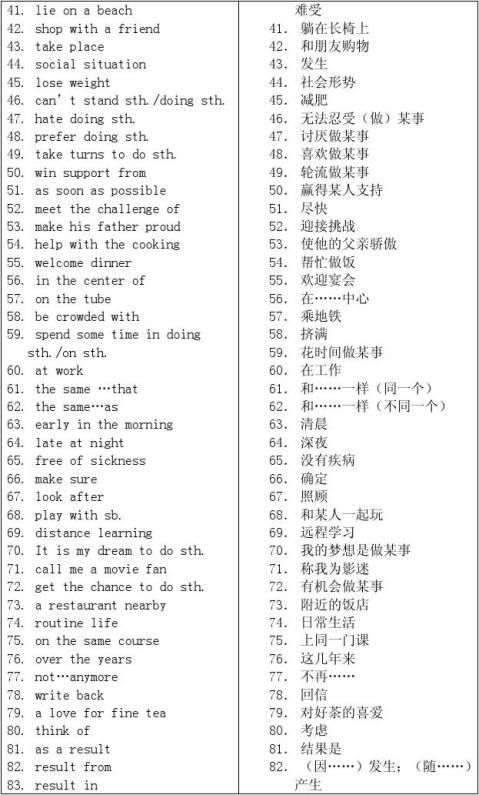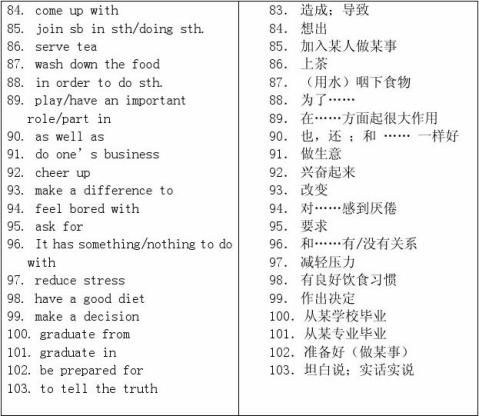篇一 :初中英语知识总结-短语、词组和重点句型归纳
初中英语知识总结-短语、词组和重点句型归纳
[短语、词组归纳]
由动词开头构成的短语、词组很多。复习时应分类处理:
一、动词+介词
1.look at…看…, look like … 看上去像……, look after …照料…
2.listen to…听……
3.welcome to…欢迎到……
4.say hello to …向……问好
5.speak to…对……说话
此类短语相当于及物动词,其后必须带宾语,但宾语无论是名词还是代词,都要放在介词之后。
二、动词+副词
“动词+副词”所构成的短语义分为两类:
A.动词(vt.)+副词
1.put on 穿上 2.take off脱下 3.write down记下
此类短语可以带宾语,宾语若是名词,放在副词前后皆可;宾语若是人称代词,只能放在副词的前面。
B.动词(vi)+副词。
1.come on赶快 2.get up起床 3.go home回家
4.come in进来 5.sit down坐下 6.stand up起立
此类短语属于不及物动词,不可以带宾语。
三、其它类动词词组
1.close the door 2.1ook the same 3.go to work/class
4.be ill 5.have a look/seat 6.have supper
7.1ook young 8.go shopping 9.watch TV/games
10. play games
[介词短语聚焦]
“介词+名词/代词”所构成的短语称为介词短语。现将Unitsl-16常用的介词短语按用法进行归类。
1.in+语言/颜色/衣帽等,表示使用某种语言或穿着……。
2.in + Row/ Team/ Class/ Grade等,表示“在……排/队/班级/年级”等。
3.in the morning/ afternoon/ evening/ 表示“在上午/下午/傍晚”等一段时间。
4.in the desk/ pencil-box/bedroom 等表示“在书桌/铅笔盒/卧室里”。
5.in the tree表示“在树上 (非树本身所有)”;on the tree表示“在树上(为树本身所有)”。
6.in the wall表示“在墙上(凹陷进去)”;on the wall表示“在墙上(指墙的表面)”。
7.at work(在工作)/at school(上学)/at home(在家)应注意此类短语中无the。
8.at + 时刻表示钟点。
9.like this/that表示方式,意为“像……这/那样”。
10.of短语表示所属关系。
11.behind/ beside/ near/ under+ 名词等,表示方位、处所。
12.from与to多表示方向,前者意为“从……”,后者意为“到……”。
另外,以下这些短语也必须掌握。如:on duty, after breakfast, at night, at the door, in the middle, in the sky, on one’s bike等。
[重点句型大回放]
1.I think…意为“我认为……”,是对某人或某事的看法或态度的一种句型。其否定式常用I don’t think…,
2.give sth. to sb./ give sb. sth. 意为“把……给……”,动词give之后可接双宾语,可用这两种句型;若指物的宾语是人称代词时,则只能用give it/ them to sb.
3.take sb./ sth. to…意为“把……(送)带到……”,后常接地点,也可接人。
4.One…, the other…/One is…and one is…意为“一个是……;另一个是……”,必须是两者中。
5.Let sb. do sth. 意为“让某人做某事”,人后应用不带to的动词不定式,其否定式为Don’t let sb,do sth.,或Let sb. not do sth. 另外,Let’s 与Let us的含义不完全相同,前者包括听者在内,后者不包括听者在内,
6.help sb. (to) do sth./help sb. with sth.意为“帮助某人做某事”,前者用不定式作宾补,后者用介词短语作宾补,二者可以互换.
7.What about…?/How about…?意为“……怎么样?”是用来询问或征求对方的观点、意见、看法等。about为介词,其后须接名词、代词或V-ing等形式。
8.It’s time to do…/ It’s time for sth. 意为“该做……的时间了”,其中to后须接原形动词,for后可接名词或V-ing形式。
9.like to do sth./like doing sth.意为“喜欢做某事”, 前一种句型侧重具体的一次性的动作;后一种句型侧重习惯性的动作,
10.ask sb.(not) to do sth. 意为“让某人(不要)做某事”,其中ask sb.后应接动词不定式,
11.show sb. sth. / show sth. to do. 意为“把某物给某人看”,该句型的用法同前面第2点。
12.introduce sb. to sb. 意为“把某人介绍给另一人”;introduce to sb.则是“向某人作介绍”。
[重点短语快速复习]
1.kinds of 各种各样的
2. either…or…或者……或者……,不是……就是……
3. neither…nor…既不……也不……
4. Chinese tea without, anything in it 中国清茶
5. take a seat 就坐
6. home cooking 家常做法
7. be famous for 因……而著名
8. on ones way to在……途中
9. be sick/ill in hospital生病住院
10. at the end of在……的尽头,在……的末尾
11. wait for 等待
12. in time 及时
13. make one’s way to…往……(艰难地)走去
14. just then 正在那时
15. first of all 首先,第一
16. go wrong 走错路
17. be/get lost 迷路
18. make a noise 吵闹,喧哗
19. get on 上车
20. get off 下车
21. stand in line 站队
22. waiting room 候诊室,候车室
23. at the head of……在……的前头
24. laugh at 嘲笑
25. throw about 乱丢,抛散
26. in fact 实际上
27. at midnight 在半夜
28. have a good time=enjoy oneself玩得愉快
29. quarrel with sb. 和某人吵架
30. take one’s temperature 给某人体温
31. have/get a pain in…某处疼痛
32. have a headache 头痛
33. as soon as… 一……就……
34. feel like doing sth. 想要干某事
35. stop…from doing sth. 阻止……干某事
36. fall asleep 入睡
37. again and again再三地,反复地
38. wake up 醒来,叫醒
39. instead of 代替
40. look over 检查
41. take exercise运动
42. had better(not) do sth. 最好(不要)干某事
43. at the weekend 在周末
44. on time 按时
45. out of从……向外
46. all by oneself 独立,单独
47. lots of=a lot of 许多
48. no longer/more=not…any longer/more 不再
49. get back 回来,取回
50. sooner or later迟早
51. run away 逃跑
52. eat up 吃光,吃完
53. run after 追赶
54. take sth. with sb. 某人随身带着某物
55. take(good) care of…=look after…(well) (好好)照顾,照料
56. think of 考虑到,想起
57. keep a diary 坚持写日记
58. leave one by oneself 把某人单独留下
59. harder and harder 越来越厉害
60. turn on打开(电灯、收音机、煤气等)
61. turn off 关
[重温重点句型]
1.So + be/助动词/情牵动词/主语.
前面陈述的肯定情况也适于另一人(物)时,常用到这种倒装结构,表示“另一人(物)也如此。”前面陈述的否定情况也适于另一人(物)时,常用“Neither/ Nor + be/助动词/情态动词+主语.”这种倒装结构。
注意:“So+主语+be/助动词/情态动词.”这一句型常用于表示赞同,进一步肯定对方的看法,表示“的确如此。”“是呀。”
2.Turn right/left at the first/second/…crossing.
这一指路的句型意为“在第一/二/……个十字路口向右/左拐。”相当于Take the first /second/…turning on theright/left.
3.It takes sb.some time to do sth.
此句型表示“干某事花了某人一段时间。”其中的it是形式主语,后面的动词不定式(短语)才是真正的主语.
4.…think/find + it + adj. + to do sth.
此句型中的it是形式宾语,不可用其它代词替代,形容词作宾语的补足语,后面的动词不定式(短语)才是真正的宾语。
5.What’s wrong with…?
此句型相当于What’s the matter/ trouble with…?后跟某物作宾语时,意为“某物出什么毛病了?”后跟某人作宾语时,意为“某人怎么了?”
6.too…to…
在so…that…复合句中,that后的句子是否定句时,常与简单句too…to…(太……而不能……)进行句型转换。
在so…that…复合句中,that后的句子是肯定句时,常与简单句…enough to…进行句型转换.
7.Sorry to hear that.
全句应为I’m sorry to hear that. 意为“听到此事我很难过(遗憾)。”常用于对别人的不幸表示同情、遗憾之意。
[重点句型、词组大盘点]
1. She used to be a Chinese teacher. 她过去是一位汉语老师。
[用法] used to + 动词原形,表示过去经常性的动作或存在的状态,含有现在不再如此之意。
[搭配] used to do的否定式可以是usedn’t to do或didn’t use to do.
[比较] used to do sth. 过去常做某事;be/ get used to doing sth. 习惯于做某事;be used to do sth. 被用来做某事。
2.…return it sooner or later.
……迟早要将它归还。
[用法] l)sooner or later意为“迟早”、“早晚”。
2)return此处用作及物动词,意为“归还”,相当于give back.
[拓展]return还可用作不及物动词,意为“返回”,相当于go back或come back。
3.No matter what the weather is like…无论天气……
[用法]no matter what 相当于whatever,其意为“无论什么”,引导状语从句。
[拓展]类似no matter what的表达方式还有:
no matter when无论什么时候
nbsp; nbsp;nbsp;no matter where无论什么地方
no matter who无论谁
no matter how 无论怎么样
4. A young man practised speaking English with Mr. Green.
一位年经人与格林先生练习讲英语。
[用法]practise doing sth. 表示“实践、练习(做)某事”。
[拓展]practice名词,“实践”、“实施”、“练习”;put a plan into practice实行某计划。
5. He encouraged everyone to take part in protecting our lakes, rivers, seas and oceans.
他鼓励大家参加保护我们的湖泊、河流和海洋的活动。
[用法]1)encourage用作动词,意思是“鼓励”、“支持”。
2)take part in“参加”,常表示参加活动。
3)protect 是动词,表示“防御”、“保护”。
[搭配]1)encourage sb. in sth.在某事上鼓励或支持某人
nbsp;encourage sb. to do sth.鼓励某人干某事
2)protect sh. from sth.使某人不受某事侵袭或伤害
6. …to warn people about sharks in the water. ……警告人们当心水里的鲨鱼。
[用法] warn用作动词,意思是“警告”、“警戒”。
[搭配]1)warn sb.+ that从句
2)warn sb. of sth. 警告某人某事
3)warn sb. to do sth.告诫某人做某事
4)warn sb. against(doing) sth.告诫某人当心某事/不要做某事
…… …… 余下全文
篇二 :英语必修一单词短语总结
高中英语必修一重点单词短语总结Unit 1
2013-05-15 10:05来源: 巨人网·英语整理 作者: 佚名
?
?
?
? [ 标签: 英语必修一 ]
导语:高中英语重在积累,每个单元稳扎稳打才能步步为营。下面是小编为大家整理的高中英语教材必修一的重点单词短语的总结,这篇是第一单元Unit1的。 Unit 1
重点单词和短语
1、add up合计 add up to?共计, 总计达
add?to把?加在里面
2、upset sb. 某人不安 upset oneself about sth. 为某事而烦恼 be upset at/about 因?而烦恼
3、ignore sb./sth. 忽视,不理会 be ignorant of 对? 无知 ,不了解 ignorant adj 无知的,愚昧的 ignorance n 无知.愚昧
4、calm vt.&vi. (使)平静;(使)镇定 calm down 镇静, 平静
calm sb. down 使某人镇静 adj. 平静的;镇定的
keep calm 保持镇静
5、concern vt. 使担忧;涉及;关系到 n. 担心;关注
…… …… 余下全文
篇三 :英语词组总结——take
take的短语
1. take + a + n.:表示做一次动作
eg.take a bath 洗个澡 take a look 看一看 take a trip 旅行
2. take aback:使吃惊,使困惑
eg.He seemed quite taken aback by the news.这个消息似乎使他吃惊不小。
3. take against:反对
4. take.....as:把.....当作,认为
5. take sb./sth. apart:①运动或比赛轻易打败,把.....打得一败涂地eg.we were simply taken apart by the other team.我们简直让另一个队打得一败涂地。
②严厉抨击:eg.In his speech he took the opposition apart.他在讲话中把对方驳得体无完肤。
take sth. apart :拆散,拆卸,拆开(机器等)
6. take sth. away ①带走②解除,消除(感情,痛苦等)eg.I was given some pills to take away the pain.我得到了一些止痛药。
…… …… 余下全文
篇四 :高中英语常见动词短语总结
常见动词短语
一.make
1.be made from由……原料制成 2.be made of由……材料制成 3.be made out of由……制成
4.be made up of由……所组成 5.be made into被制成…… 6.be made to do sth. 被迫去做
7.make for=head for =make towards走向;冲向 8.make oneself understood/heard使自己被理解/听到
9.make…out理解;看清楚;辨认 10.make a living谋生
11.make…up弥补;补偿;起草;捏造;化装;构成,占;言归于好,和解
12.make bed铺床 13.make…clear表明;说明 14.make ends meet应付开支;维持生活;使收支相抵
15.make friends with与……交朋友 16.make one’s way to sp.向……走去
…… …… 余下全文
篇五 :高考英语词汇短语总结--I字母开头
高考词汇短语总结---I字母开头
1. have no idea of 不知道 = be in ignorance of = be ignorant of
2. identify 认出,鉴定 identify one’s luggage
3. as if = as though 似乎 He looks as if he were tired if only 但愿 If only I were a bird.
4. even if = even though 即使 Even if it rains, I will go.
5. ignorant 无知的 an ignorant man 无知的人 be ignorant of不知道 ignore 不顾 (take no notice of) He ignored personal danger.
6. imaginary 虚构的 imaginative 想象的 an imaginative student 富有想象力的学生 imagination n.想象力 have a good/poor imagination 想象力好/坏 imagine 想象 imagine doing/that Imagine yourself to be alone at home, what will you do ?
…… …… 余下全文
篇六 :北师大版高中英语词组小结
北师大版高中英语高一必修(1)词组小结



Phrases Unit 1
1. practice doing 2. introduce A to B 3. be good at 4. on Channel 4 5. attitude to/towards 6. make a mistake mistake A for B 7. enough 8. as long as 9. look through 10. fill A with B be filled with
be full of
11. match A with B
12. your own
13. too much
too many
much too
14. sb spend time/money on sth sb spend time/money in doing
15. at weekends
…… …… 余下全文
篇七 :初一英语下册词组语法总结
Unit 1 Where’s your pen pal from?
一.短语: 1、be/come from:来自
2、live in Paris:住在巴黎
3、write to me soon:快点给我写信
4、play sports:运动、锻炼
5、speak a little French:讲一点法语
6、like going to the movies with my friends: 喜欢和我的朋友去看电影
7、tell sb about...告诉某人关于、、、、、、
8、an interesting country: 一个有趣的国家
9、in November: 在十一月
10、speak a little French: 说一点法语
11、like playing sports:喜欢做运动
12、her favorite language:她最喜欢的语言
13、write to Tom:写信给汤姆
14、Jolie’s pen pal:朱利的笔友
15、likes and dislikes:好恶、爱憎
二.重点句式:
1 Where’s your pen pal from? = Where does your pen pal from/ 2 Where does he live?
…… …… 余下全文
篇八 :高一英语重要词汇总结
高一英语重要词汇总结
Unit 1
重点词组
1. fond of “喜爱,爱好” 接名词、代词或动词的-ing形式。例如:
He’s fond of swimming. 他喜欢游泳。
Are you fond of fresh vegetables. 你喜欢新鲜蔬菜吗?
He is fond of his research work. 他喜爱他的研究工作。
注意:like, enjoy, be fond of, love 都有“喜爱”、“喜欢”的意思,但在用法上和喜爱的程度上有所不同。like是一般用语,用得最广泛,后面的宾语可以是名词、不定式或动词-ing形式。enjoy 喜爱的程度比like稍强一点,后面只可以跟名词或-ing形式,而不跟不定式。Love在这三个词中表达喜爱的程度最大,语气最强,感情色彩最强烈,有“热爱”之意,后面的宾语可以是名词、不定式或动词-ing形式。be fond of(=like very much),在喜 爱的程度上比like强,但比love弱,后面只可以跟名词或-ing形式。
2. hunt for = look for寻找
I have found the book I was hunting for.我找到了那本我在找的书。
…… …… 余下全文